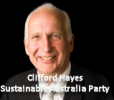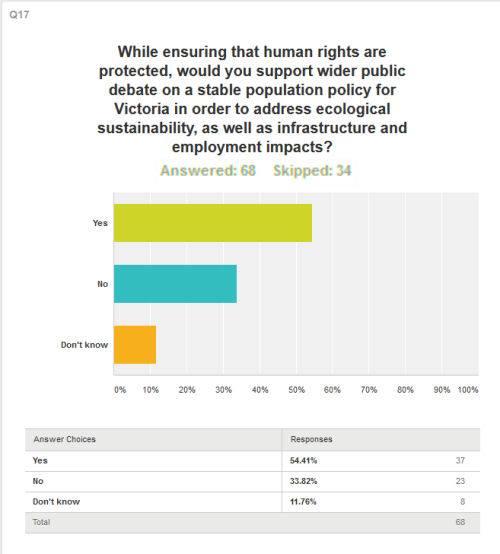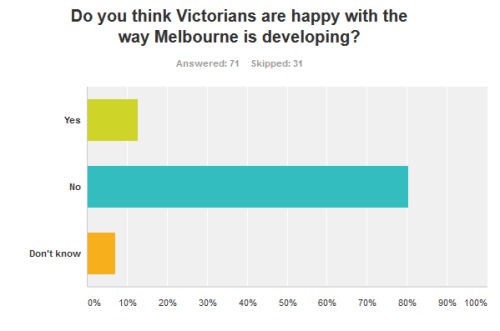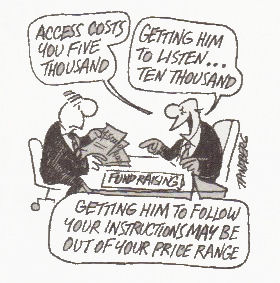 Well not really praise as such but, bear with me, while I justify wandering into this absurdity. I know it's difficult to say nice things about MP Craig Kelly, who claimed that people would die because renewables were raising electricity prices. He was perhaps unaware that the World Health Organisation in 2008 calculated that coal particulate pollution caused one million deaths across the world. And Tony Abbott who, between mouthfuls of onion, told us that coal was good for humanity - which was in opposition to both the Pope and the British Royal family's position - the two institutes he holds dear to his heart. Those are just two of 34 confirmed deniers in the LNP, although the Institute of Public Affairs claims half of the LNP members are supporters of their position.
Well not really praise as such but, bear with me, while I justify wandering into this absurdity. I know it's difficult to say nice things about MP Craig Kelly, who claimed that people would die because renewables were raising electricity prices. He was perhaps unaware that the World Health Organisation in 2008 calculated that coal particulate pollution caused one million deaths across the world. And Tony Abbott who, between mouthfuls of onion, told us that coal was good for humanity - which was in opposition to both the Pope and the British Royal family's position - the two institutes he holds dear to his heart. Those are just two of 34 confirmed deniers in the LNP, although the Institute of Public Affairs claims half of the LNP members are supporters of their position.
Money and truth
That sounds like a lot of politicians on the wrong track (the US has 180 deniers in Congress!) and its certainly one of the reasons that action on climate change has stalled. But there are a total of 226 federal politicians in both houses, so what were the rest doing? Can 34 deniers be so powerful as to dominate an issue, or are these the nice guys who are actually honest enough to nail their colours to the mast and challenge their electorate to vote for them on the policies and their natural charm and charisma? And, as such, are they not more commendable than the other 192 so called “believers”, including Malcolm Turnbull, who promote or knowingly participate in the processes that are destroying the planets climate?
Which then prompts the question as to why on earth would we have a higher percentage of deniers in parliament than in the general public, and why are so many advocating or just accepting policies that harm the planet? Well, there is money, and lots of it, that comes from those who would like the government to continue with policies that benefit the donor at the expense of the environment. These donations are so important, and so potentially embarrassing, that the major parties have only been transparent with 10 to 20% of their disclosures. What we do know is that Fossil Fuel companies have declared donations of $968,343 to the ALP, Liberal and National parties in 2016-17, which was slightly down from the $1.03m donated in 2015-16 and $1.94m in 2014-15 (which was also a Federal election year).
https://theconversation.com/the-truth-about-political-donations-there-is-so-much-we-dont-know-91003
The usefulness of economics in political ideology
However even the most cynical politician, one who depends on this source of money for re election, would baulk at supporting some of the improprieties we have had thrust upon us by successive governments, unless there was some way to quell his/her distaste for their parties' actions. One way this can occur is via embracing a particular ideology - which by definition is a system of beliefs and ideals which forms the basis of economic or political theory and policy. As such, it's not all that different to its equivalent in religion – faith – as both tend to smother reasoning lest it lead to inconvenient conclusions.
Ideology plays a big part in how political parties and governments function, largely because aspiring politicians can't get endorsement without supporting the parties' theories and must then ‘tow the party line’ or risk dis-endorsement. But it does mean that a minority group can usurp control of a party, something that has occurred in all parties: The modern Liberal is nothing like the Menzies model which was high tax, (by today's standard) protectionist on trade, big on regulation, and ran with a budget surplus and low unemployment (2.2%). The Labor party was instinctively socialist until Paul Keating embraced Milton Frieberg's fantasies with the result that we have two mainstream parties of the right with the Liberal party pushed into the hard right effectively destroying the moderates (wets) and handing power to the ultra conservatives. Barry Jones the former ALP science minister described this as "political compaction," giving voters a choice between McDonald's and KFC.
And when it comes to ideology economics is a star performer. No matter what political camp, be it neo conservative, (hard right) neo liberal, (center right to center left), socialism or communism, economics rules, and does so without a soul, because its criteria for assessment is reduced down to a single figure called the Gross Domestic Product (GDP). Governments of the world assume that this one statistic can show whether things are getting better or worse despite the occasional hic-up like the Global Financial Crises. Yet as a measurement it was only adopted in the war years when production (of war material) was the key to winning the war. It did not measure human health, education, poverty, unemployment or environmental damage because the war took precedence over all the things that make up human well being. As a result today's governments will still prioritize policies or projects that will add to GDP, especially if it does so in the governments term of office. They can also virtually ignore those things that are not measured in financial terms and this includes damage to human health or the environment which are dismissed as being “externalities” of lesser importance than its contribution to “the economy” .
Nobel family rejected economics for inclusion in Nobel Prize
Economists (and to a lesser extent politicians) are so obsessed with this they have described GDP as one of the greatest inventions of the 20th century - and they have a point. Because now there is something definitive to give them credibility as policy makers and guardians of wisdom even though there is no correlation between GDP and wellbeing. To enhance this self appointed credibility and to justify all the absurdities they inflict upon us, economists usurped the prestige associated with the Nobel prize which as you may know was an initiative of Alfred Nobel back in 1901. The awards were issued for Chemistry, Physics, Literature, Medicine and Peace, there was no prize for economics mentioned in Alfred Nobel’s will. This didn’t materialise until 1968, when the Swedish Central Bank wanted to do something special for its 300th birthday. It made a donation to the Nobel Foundation to sponsor a prize and to make it more acceptable they called it a prize for ‘economic sciences’. Since the economics prize is announced at the same ceremony it is virtually indistinguishable from the others but the Nobel family estate didn’t approve so at the family’s insistence, the prize was given the name it has – the Sveriges Riksbank Prize given ‘in memory of’ Alfred Nobel, and not a true Nobel prize. Which is just as well since Nobel specified that his prizes should go to people who’s work has “conferred the greatest benefit on mankind”. That’s relatively easy to decide a winner in the traditional sciences, but the economic prize has often gone to people with completely opposing views. One recipient, Myron Scholes the 1997 winner, will forever be remembered by the failure of his hedge fund Long-Term Capital Management (LTCM) which collapsed in 1998 losing $US4.6 billion of investment.
Like any Nobel, the prize gives economists a stamp of approval in the mind of the general public, legitimising their entire philosophy. Of the 74 laureates so far, 28 are affiliated with the University of Chicago, the home of neoliberalism including Milton Friedman and Friedrick Hayek (architects of what become known as Reaganomics - deregulation, and the trickle down effect which double the US national debt) but even Hayek expressed doubt about the award saying:
“If I had been consulted whether to establish a Nobel Prize in economics, I should have decidedly advised against it. The Nobel Prize confers on an individual an authority which in economics no man ought to possess.”
Economic absurdities and political policies
This does not matter in science where the influence exercised by an individual is chiefly on his fellow experts - and they will soon cut him down to size if he exceeds his competence. But economist have influence over laymen: politicians, journalists, civil servants and the public, which gives them undeserved authority that is often used to override warnings from almost all other avenues, including scientific bodies. John Howard once remarked that “we could grow forever,” later admitting that we would need to rely on imported food to do so. Larry Summers, a former adviser to President Obama, stated, "The idea that we should put limits on growth because of some natural limit is a profound error, and one that, were it ever to prove influential, would have staggering social costs." It is a comment often repeated, despite being contrary to even basic mathematics, and was justified by referring to growth as being “sustainable”. When this was seen to be an oxymoron the wordsmiths produced an alternative, environmental problems can be “decoupled” - that is isolated - from growth, and even from population growth. There is no doubt that this form of economics, with its obsession with an ever expanding economy and dubious accounting, has been a great benefit for corporations like the fossil fuel industry. But it is also partially or wholly responsible for most of problems that now beset the world, including plastic pollution in oceans, air pollution in cities, the obesity pandemic, the collapse of coral reefs, and all the threats associated with catastrophic climate change. All so much different from a previous age, when President Kennedy was said to have had a plaque on his desk with the message, “The Buck Stops Here,” meaning that responsibility lies with those in power. Oddly enough the last time Australia had a prime minister who took responsibility for his mistakes was when Kevin Rudd admitted we could not meet his GHG reduction targets because of the population growth he had championed. And his Big Australia dream is still alive and well in the major political parties as well as the Greens.
Don Owers
 voted to quash a Motion by Clifford Hayes to clean up political donations in Victoria, proving their dependency on the flimsy and corrupt status quo. The Motion was defeated in the Legislative Council in May.
voted to quash a Motion by Clifford Hayes to clean up political donations in Victoria, proving their dependency on the flimsy and corrupt status quo. The Motion was defeated in the Legislative Council in May.
 Well not really praise as such but, bear with me, while I justify wandering into this absurdity. I know it's difficult to say nice things about MP Craig Kelly, who claimed that people would die because renewables were raising electricity prices. He was perhaps unaware that the World Health Organisation in 2008 calculated that coal particulate pollution caused one million deaths across the world. And Tony Abbott who, between mouthfuls of onion, told us that coal was good for humanity - which was in opposition to both the Pope and the British Royal family's position - the two institutes he holds dear to his heart. Those are just two of 34 confirmed deniers in the LNP, although the Institute of Public Affairs claims half of the LNP members are supporters of their position.
Well not really praise as such but, bear with me, while I justify wandering into this absurdity. I know it's difficult to say nice things about MP Craig Kelly, who claimed that people would die because renewables were raising electricity prices. He was perhaps unaware that the World Health Organisation in 2008 calculated that coal particulate pollution caused one million deaths across the world. And Tony Abbott who, between mouthfuls of onion, told us that coal was good for humanity - which was in opposition to both the Pope and the British Royal family's position - the two institutes he holds dear to his heart. Those are just two of 34 confirmed deniers in the LNP, although the Institute of Public Affairs claims half of the LNP members are supporters of their position. “Every week, groups like ours receive calls from distressed residents, appalled at the conduct of planning in Victoria. People expect clear planning rules, integrity in governance and decisions in the long term public interest. Instead we have a rampant culture of secrecy and non disclosure, conflicts of interest, a perception of favoured access and undue influence, and a risk and perception of corruption.” - Ann Birrell, Vice President of Save Our Suburbs. SOS conducted a survey of Victoria's election candidates on associated matters and found 90 per cent and more support for planning reform. Candobetter.net's editors note that 54% supported wider population debate for a stable population on ecological grounds. The full questionnaire is to be found at
“Every week, groups like ours receive calls from distressed residents, appalled at the conduct of planning in Victoria. People expect clear planning rules, integrity in governance and decisions in the long term public interest. Instead we have a rampant culture of secrecy and non disclosure, conflicts of interest, a perception of favoured access and undue influence, and a risk and perception of corruption.” - Ann Birrell, Vice President of Save Our Suburbs. SOS conducted a survey of Victoria's election candidates on associated matters and found 90 per cent and more support for planning reform. Candobetter.net's editors note that 54% supported wider population debate for a stable population on ecological grounds. The full questionnaire is to be found at 




Recent comments